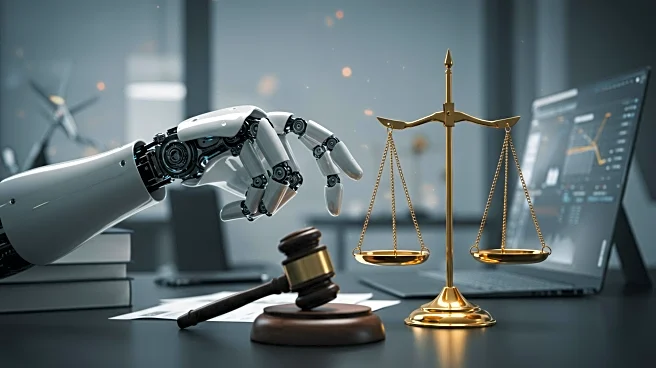What's Happening?
Law firms are increasingly adopting artificial intelligence (AI) tools to transform their legal workflows, driving innovation and redefining roles within the industry. A panel discussion involving three law firms and a legal-tech company highlighted the growing phenomenon of AI Overload, where the influx of generative AI tools is reshaping firm operations. The adoption of AI is becoming standard practice, with firms experiencing accelerated integration driven by both top-down interest and bottom-up experimentation. This shift is fostering new forms of cross-functional collaboration and setting new norms in the legal sector. Firms are investing in training programs to ensure legal teams understand AI tools and can effectively audit and apply human judgment to AI-generated outputs. The strategic integration of AI is seen as essential for maintaining competitiveness and delivering high-quality services to clients.
Why It's Important?
The integration of AI tools in legal workflows is significant as it represents a transformative shift in how legal services are delivered. By automating routine tasks and enhancing collaboration, AI can increase efficiency and reduce costs, benefiting both law firms and their clients. This technological advancement allows firms to focus on high-value tasks, leveraging human expertise where it matters most. The adoption of AI also poses challenges, such as ensuring ethical use and maintaining control over workflows. Firms that successfully balance AI integration with human involvement stand to gain a competitive edge, attracting top talent and meeting evolving client expectations. The strategic use of AI can lead to improved service delivery, fostering innovation and resilience in the legal industry.
What's Next?
Law firms are expected to continue exploring AI integration, focusing on areas where AI can add the most value while maintaining strong governance over unique or high-value workflows. Firms will likely invest in partnerships with legal tech vendors to co-create training programs and certifications that enhance AI literacy among legal professionals. As AI tools become more prevalent, firms will need to address ethical considerations and ensure transparency in decision-making processes. The ongoing dialogue between practice groups and knowledge teams will be crucial in aligning AI initiatives with strategic goals. Firms may also develop new roles and collaborative networks to support AI-driven innovation, ensuring that human expertise remains central to legal service delivery.
Beyond the Headlines
The adoption of AI in legal workflows raises ethical and cultural questions about the role of human judgment in legal practice. As AI tools become more autonomous, firms must consider the implications for data governance, risk management, and client relationships. The shift towards AI-driven workflows may lead to changes in recruitment practices, as firms seek professionals who are comfortable working in technology-rich environments. Additionally, the integration of AI could influence billing models and client expectations, prompting firms to reevaluate traditional practices. By thoughtfully designing AI-augmented workflows, firms can preserve the human element and maintain control over their operations, ensuring that technological advancements enhance rather than replace human expertise.











